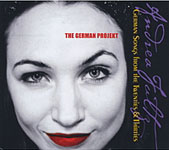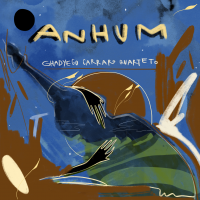Home » Jazz Musicians » Andrea Fultz
Andrea Fultz
Jazz is an infinitely malleable art form, and Andrea Fultz may be the first vocalist to stretch the music in such a convincingly Teutonic direction. A singer who combines a thespian’s emotional resourcefulness with a jazz vocalist’s rhythmic flexibility, Fultz can infuse fresh drama to American Songbook standards, croon lilting bossa novas, and keep a dance floor gyrating with insinuating electronica grooves. But the Munich-born Fultz defines herself with The German Projekt, a tough, unsentimental new album that plunges jazz into deliciously dangerous waters.
More than a singular cultural synthesis, The German Projekt is a riveting musical journey that brings Fultz’s savvy jazz sensibility to the sardonic Weimar repertoire of Kurt Weill, Bertolt Brecht, Friedrich Hollaender, and Hanns Eisler. While jazz musicians have long embraced a handful of Weill songs (“Mack the Knife,” “My Ship,” “September Song”), Fultz delivers most of the music in German, setting the sturdy songspiel melodies to beautifully calibrated, jazz-infused arrangements. “It is a big thing for me to represent German culture in America,” Fultz says. “I really think this music is brilliant. Brecht and Weill and Hollaender are so timeless.”
The album’s only two English language songs offer a strong indication of Fultz’s thematic range. “Alabama Song,” the rollicking opening track, is a scorching, bluesy tune made famous in the 1930 Brecht-Weill opera Rise and Fall of the City of Mahagonny (where it was originally performed in Brecht’s idiosyncratic English). Many Americans discovered the tune on The Doors’ debut album, but in Fultz’s hands “Alabama Song” serves as an introduction to a topsy-turvy world in which the usual themes tackled by jazz singers��"the longing, euphoria, and bitterness inspired by romance��"give way to a much more expansive world of concerns.
Toward the end of the CD, Fultz delivers a defiant, spit-in-their-faces rendition of Brecht and Eisler’s “Song of a German Mother,” a gut-wrenching repudiation of fascism. In between, she delves into the bloody revenge fantasy of “Seeräuber Jenny” and detailed description of dissolution in “Bilbao Song.”
While steeped in the politics and anything-goes experimentalism of the Weimar era, The German Projekt was born far from Deutschland's soil, and that just might be the key to its exquisite balance. Working with some of the San Francisco Bay Area’s top improvisers and arrangers, Fultz honed a repertoire of classic German cabaret songs, embracing the genre’s inherent theatricality while interpreting the music with improvisational skills gleaned from some of the world’s finest jazz singers.
Read moreTags
Andrea Fultz: The German Projekt German Songs from the Twenties and Thirties

by Andrew Velez
Since its origins in the turbulent 1920s-'30s, and with the occasional exception of a vocalist-cum-chanteuse like Ute Lemper, the authoritative renditions by Marlene Dietrich and Lotte Lenya have pretty much held title to this music, which might be called the Great German Songbook. Which makes it all the more impressive that Munich-born Andrea Fultz, who has worked with a variety of bands with material ranging from American Songbook to electronica and bossa nova, makes so impressive an impact with this ...
Continue ReadingAndrea Fultz Sings Brecht-Weill & More on "German Projekt" CD

Source:
Terri Hinte Publicity
On her stunning new CD The German Projekt, which features jazz-imbued arrangements of classic songs by Brecht-Weill and Friedrich Hollaender and which is being released on May 12, singer Andrea Fultz sounds as if she'd been born to interpret this rich, complex body of music.
But in fact the album concept came to fruition a mere three or four years ago, while she was living and studying in San Francisco and performing with musical colleagues who were interested in exploring ...
read more
"German Jazz
Andrea Fultz is the child of two cultures, and her music fully embraces both. Raised in Germany and Austria by her American father and German mother, she has spent a good deal of the last decade in the Bay Area, where she’s developed strong ties to some of the finest musicians in the region. A brilliantly expressive singer steeped in jazz, Fultz has honed a repertoire of tunes gleamed from 1920s to 1940s German theater and cabaret by songwriters such as Kurt Weill, Bertolt Brecht and Friedrich Hollaender, who had a highly successful career as a Hollywood composer particularly writing for Marlene Dietrich, after fleeing the Nazis.
Music
Recordings: As Leader | As Sideperson











